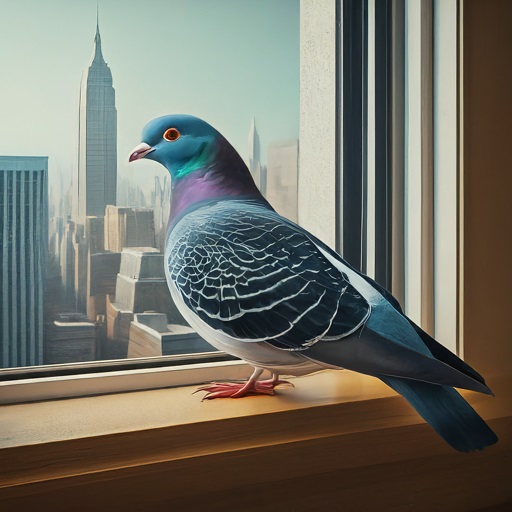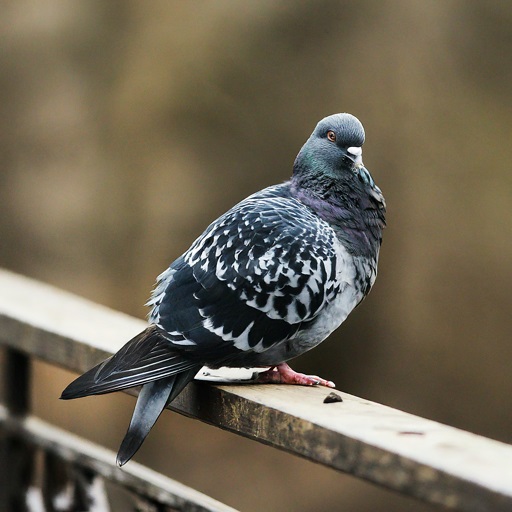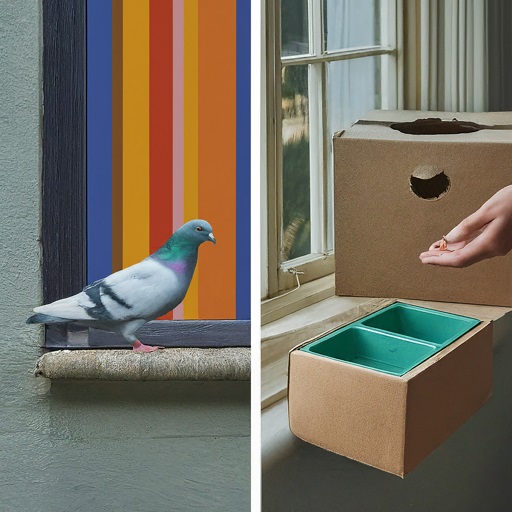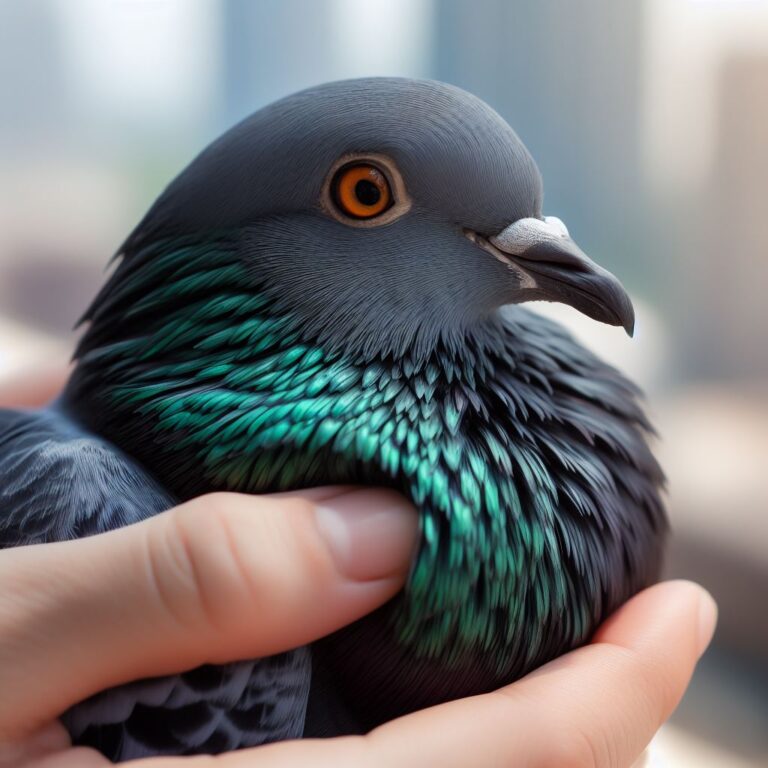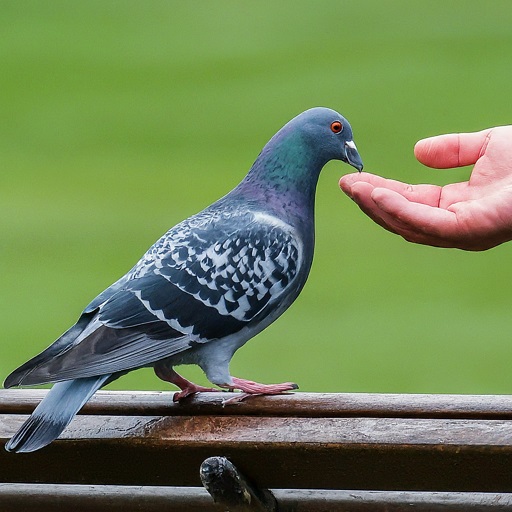Can You Keep A Wild Pigeon As A Pet?
Undoubtedly, the pigeon is considered one of the most versatile bird species adapted to urban settings, coexisting with human settlements & foraging on human scrap foods available. Since they are common in urban cities, you might wonder, ‘Can you keep a wild pigeon as a pet.’ If this is the case, I will help you learn how to keep wild pigeons as pets and guide you on this avian journey.
I will help you learn everything you need to know about petting pigeons. But before you try to adopt any pigeon, I will advise you to get familiar with these creatures & their intriguing behavior. Avoid getting any pigeons as pets without knowing what you are getting into. Here, you’ll learn the challenges, pros, cons, & legal considerations of keeping wild pigeons in captivity. Also, I will help you learn how to pet a wild pigeon. But before all this, let’s start by asking, ‘Can you have a wild pigeon as a pet?’
Understanding Wild Pigeons
Let’s start by getting to know these fascinating creatures a little better. Wild pigeons, scientifically known as Columba livia, are a common sight in both urban & rural areas. According to a research study by the Cornell Lab of Ornithology, pigeons have adapted well to human environments, making them a widespread & familiar bird species.
Pigeons are intelligent & social beings, capable of forming strong bonds with their flock members. They are known for their cooing calls, impressive aerial displays, & beautiful iridescent feathers. Research by the University of Oxford reveals that pigeons exhibit remarkable navigational abilities, often relying on Earth’s magnetic fields to find their way home.
The Role of Pigeons in the Ecosystem

Before we delve into the idea of keeping pigeons as pets, it’s crucial to understand their ecological significance. Pigeons play a crucial role in the ecosystem as seed dispersers. A study published in the Journal of Avian Biology found that pigeons consume various seeds, helping distribute plant species across different habitats.
Additionally, pigeons serve as nature’s clean-up crew. Research from the University of Basel shows that pigeons consume substantial amounts of food waste in urban areas, reducing the burden on sanitation services & contributing to waste management.
Can You Keep a Wild Pigeon as a Pet?
No, it would be best if you didn’t keep a wild pigeon as a pet because it comes with unique challenges. Firstly, pigeons are not domesticated animals like dogs or cats. Their instinct may clash with their expectation of traditional pet keeping because they are known for a strong homing instinct, making it difficult to adapt to a confined living space.
Keeping a wild pigeon in captivity may lead to stress & as well as other health issues affecting its longevity. Since the research study by the corner lab of Ornithology stated that pigeons had adapted well to urban/human environments, making them a widespread & familiar bird species, many people think of getting one in their apartment.
Even though pigeons are known for their high intelligence level & social being capable of forming strong bonds with their flock members, it’s not a good idea to keep a wild one in captivity. As I told you earlier, pigeons are known for their strong homing instinct, and keeping a wild one in captivity may result in stress because it won’t be able to fly back to its nest.
If you wonder, ‘Do Pigeons Make Nests?‘ then yes. To learn more about it, consider reading my article on pigeon nesting behavior, which includes topics like ‘How do pigeons nest,’ ‘When Do Pigeons Nest,’ & many more. Returning to the point, you also face many challenges when keeping a pigeon, especially the wild one, in captivity.
When Is Petting a Wild Pigeon Appropriate?

Even though keeping wild pigeons as traditional pets is not recommended, there are also a few exceptions. If you encounter injured or orphaned pigeons in the wild, you can provide them temporary care in human & ethical action. I will also highly advise you to contact your local wildlife rehabilitation center, which can provide you with the right approach with their expertise & experience in handling birds like pigeons.
Also, a study by the Wildlife National Wildlife Rehabilitation Association indicates that professional care is advisable to improve the chances of Survival for injured pigeons. Indeed there will be some advantages & disadvantages of adopting wild pigeons, so let’s take a quick look at that.
Pros & Cons of Petting Wild Pigeons
Since keeping wild pigeons is quite a topic of debate due to its potential impact on the bird and public health, I’m mentioning some pros & cons that you must consider first.
3 Pros Of Petting Wild Pigeons
Bonding With Nature
If you’re like me who love nature & its creation then you might also feel very happy by petting & feeding the pigeons. Well, feeding wild pigeons & petting them provide a sense of connection to nature & the wildlife around them which is a plus.
Stress Relief
There have been many studies that have shown that interacting with animals usually reduces stress levels in humans. Therefore, if you interact with a wild pigeon, you will experience a calming & stress-reducing effect on your body.
Educational Opportunities
Keeping a wild pigeon in captivity gives you many educational opportunities to observe & interact with them, especially for children who are always keen on learning new things like birds’ behavior & characteristics. It also helps in enhancing empathy towards animals. Undoubtedly Birds like pigeons can foster a greater appreciation for nature & environmental conservation.
5 Cons Of Petting Wild Pigeons
Disease Transmission
I don’t know if you know this, but wild pigeons may carry various diseases, some of which can easily be transmitted to you through direct contact or their dropping. You should know that their droppings contain bacteria, uric acids & contaminants known to cause sickness in humans with direct contact. Also, you should note that their dropping can corrode metal, paint, and cement, which is not good for your home structure.
Therefore, if you find a nest in your property, it may lead to an accumulation of dropping around, damaging your landscape. I recommend you consider pigeon nest removal by a professional who will safely relocate the nest for you in an appropriate location. You can consider reading my recent article on How to Get Rid of Pigeon Nests & How To Stop Pigeons Nesting.
Including this, I will advise you to also check my post on what happens if you destroy a pigeon nest and why pigeon nests are so bad. Coming back to the point, some common illnesses you may experience after getting in contact with a wild pigeon or dropping include salmonellosis & histoplasmosis.
Disruption Of Natural Behavior
By repeatedly approaching & petting a wild pigeon, you might be disrupting its natural behavior, which is not good. Plus, approaching a wild pigeon may cause stress for the bird.
Dependency On Humans
If you consider petting or feeding a wild pigeon, it might lead to dependency on your provided food. It’s not good for wild creatures like pigeons to depend on human-provided food, which directly interferes with their ability to forage naturally & survive for longevity.
Overpopulation
You might already have noticed the urban environment hosts many pigeons; therefore, regularly feeding a wild pigeon may lead to overpopulation because of the widely available food source. Suppose might also lead to an imbalance in the local ecosystem, which is not good for anyone or anything.
Public Perception
You should also know that some people may also view feeding or petting wild pigeons as a nuisance or unhygienic, which will directly affect the public perception & attitude toward these birds & you. Also, feeding affecting wild pigeons can be prohibited or regulated for some reason due to concerns about wildlife Management & Public Health.
Legal & Ethical Considerations
In the above section, I told you that feeding or petting wild pigeons can be prohibited or regulated in some areas. Even though pigeons are not protected by federal laws in most countries, it is important that you also consider the moral implications of keeping a wild animal in captivity. World animal protection organizations say that petting & keeping wild animals will cause them immense stress while disturbing their natural behavior.
Depending upon your location & wildlife protection act, it is illegal to have lofts In some places to house pigeons or other wildlife as pets without getting a proper permit. Therefore, I will advise you to always check with your local wildlife authorities to ensure compliance with your area’s laws. If your local laws allow you to keep wild pigeons & feed them, here is how to pet a wild pigeon safely & ethically.
How to Pet a Wild Pigeon Safely & Ethically
If you find yourself in a situation where you need to provide temporary care to an injured or orphaned pigeon, here are some guidelines to follow:
Contacting Wildlife Rehabilitation Centers
While doing my research, I learned about a study published in the American Social Association of wildlife veterinaries stating that you must contact a wildlife rehabilitation center as a first step when you come across an injured pigeon to get help from their expertise & resources for appropriate care. I will also advise you to take the help of the internet or local directories to find the nearest wildlife rehabilitation centers in your area.
If you fail to find one, consider contacting the International Wildlife Rehabilitation Council, which will provide valuable information on reputable centers. When you are waiting for professional help to arrive, I will advise you to keep the wild pigeon in a quiet & safe place. Also, ensure you are not handling the bird to avoid additional stress.
Understanding Pigeon Behavior
Before approaching the birds, I will advise you to observe them from a distance. Birds like pigeons can easily get frightened, especially the wild ones. Plus, make sure you are avoiding any loud noises & sudden movements that may cause them to fly away or become agitated. When you are talking with your bird or anyone, make sure to speak softly & move slowly around the pigeon. It is important to give your birds time to assess your presence & become comfortable with your proximity. If a pigeon shows signs of distress or discomfort, you must back away and give it space. It is important that you respect all creature’s boundaries for their well-being & to avoid stress.
Providing Temporary Care for Injured or Orphaned Pigeons
If you find a wild pigeon injured, I will advise you to contact professional help. While waiting for professional help, ensure you’re keeping the bird in a safe & comfortable space. I will advise you to get a cardboard box & make some air holes to serve as a temporary enclosure. Also, offer them water in a shallow dish to prevent the bird from dehydrating. And, also avoid the temptation to feed the bird unless it is advised to do so by a wildlife expert. Also, ensure that you are keeping the injured pigeon in a warm & quiet environment, away from any pet or other potential sources of stress.
Release & Rehabilitation
When the wildlife rehabilitation center takes charge, you must follow their advice on the best course of action for its rehabilitation. Here, the goal should be to prepare the pigeon to eventually be released back into the wild after getting proper rehabilitation, including medical treatment, proper nutrition, & exercise. According to a study by the Royal Society for the Protection of Birds, a successful rehabilitation & release program will further help contribute overall Health & sustainability of pigeon populations worldwide.
Supporting Wild Pigeons Without Petting
According to the British Trust for Orthinologists study, you can consider providing your bird with supplementary food to help them survive during Harsh weather conditions. Therefore rather than keeping the wild pigeon in captivity, you can consider setting up a bird feeder with pigeon-friendly foods like seeds, grains & fruits on your property to attract Birds.
By placing a bird feeder in your garden, you will attract pigeons and doves, which are said to be a symbol of peace & love in many cultures. Do you know many people get confused about identifying doves and pigeons? If you also don’t know how to differentiate or tell them apart, I will advise you to consider reading my article on ‘Are doves pigeons?’ Pigeon Vs Dove 5 key differences.
Coming back to the point, I will advise you to also plant native trees & shrubs on your property, which further provide shelter & nesting opportunities for pigeons. If you are a birdwatcher like me, you should also consider investing in a good pair of binoculars to observe them from a distance.
According to the Audubon Society, using 8×42 binoculars for bird watching is advised. You can also consider joining local bird-watching groups or clubs to learn more about pigeons & other Avian species in your area. Do you know that rock doves are said to be wild of domesticated pigeons? If you want to learn more about it, I will advise you to consider reading my article on ‘Rock Dove Vs Pigeon.’
Conclusion
Even though keeping pigeons as a pet is not advisable, providing them temporary care if they are injured or orphaned is recommended as an act of compassion or & kindness. Always make sure you contact the local wildlife rehabilitation for professional assistance, the best course of action & success in recovery for the bird.
Rather than keeping the wild pigeon as a pet in captivity, you should consider supporting them in the wild through a bird-friendly environment and responsible observation. All these are excellent ways to appreciate Birds like pigeons while ensuring their well-being & Health. I have given my best to give you all the information you need on the question: can you keep a wild pigeon as a pet?
If you find this article helpful, then consider sharing it. Your share will help people learn about’ can you keep a wild pigeon as a pet’ and what legal considerations they should consider before adopting one. Do check my other helpful guide on pigeons as pets. See you in the next post, till then, take care & goodbye.

